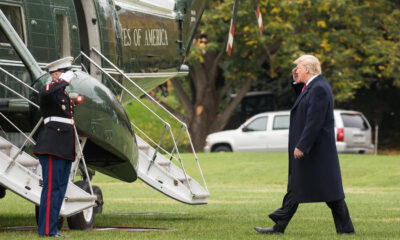Civilization
Selecting Generals and Admirals Who can Fight and Stay out of Jail

The recent arrest of Admiral Robert Burke on corruption charges is an indication of the decline in the quality and integrity of our general and flag officers (GFOs) to an alarming degree. To remedy this decline, Congress needs to re-evaluate how we select GFOs. Since retiring from active duty in 2000, I have known several military officers who achieved flag or general officer rank and for a disturbing number of them, I would not follow into a pillow fight, much less armed combat. Too many reached that rank by being skilled bureaucrats, not making enemies, and keeping superiors happy.
Current GFOs get that rank through the Peter Principle
An alarming number led our forces in Iraq and Afghanistan, not all were ineffectual, but too many were. That does not mean that they were bad officers, many are accomplished managers and technocrats who have done great service for their country, and we need them to keep our complex war machine running. For example, General Leslie Groves, who managed the Manhattan Project that developed the Atomic Bomb would have been a mediocre combat leader, but his managerial skills and judgment were superb. But how to we ensure that our GFOs possess the warfighting and leadership skill necessary to lead our military.
It takes a special set of skills to be an effective combatant commander. This is particularly true in today’s complex environment where civilians are often used as human shields. We need a way to identify those potential GFOs who are fit to command in combat from the division level to theater command from those who should manage offices at the Pentagon and other high-level staff positions. The “One size fits all” GFO selection needs to be replaced.
Admission to war college
To start, officers selected to attend war colleges are those the services consider to be potential candidates for higher level command. They are the officers at the 0-5 (Lieutenant Colonel/Commander) rank who have successfully commanded at the battalion/warship level or an equivalent command in logistics or support activities. The logisticians and other service support personnel need not be discussed here as they are the future leaders in the tradition of Groves. Selection of GFO level combatant commanders should begin at the war college level.
War colleges are the places where high level military operations and strategy intersect with civilian political policy making to craft our nation’s grand strategy. This needs to be the core of what is taught at this level, however, what should change is that those officers who desire to be considered for GFO rank combatant command should be held behind for a month of intensive command screening through a series of war games and role playing simulations where the candidate combat flag officers would be required to make difficult decisions under time constraints and with incomplete information.
Defending reasoning
They should also be able to defend their reasoning through tough questioning, some people simply cannot do that. The inability to make tough decisions under pressure need not be career ending. Those who cannot stand up to the rigor, but who have records good enough to be selected for war college should be given a staff or non-combat command track. Those who survive the screening process should go on to command regiments, brigades, air groups, and naval strike groups. If they are successful at that level, then they should be considered for GFO level combatant command.
Such exercises should not be limited to operational and military strategic decisions, they should also examine the moral courage of the candidate. Tough decisions under the pressure of legal and operational uncertainty yield a great deal about a candidate’s character. Along with hard choices regarding purely operational and military decisions, the candidates should be required to make moral judgments in nearly impossible situations.
If this sounds to informed readers like the old German General staff selection system, it is but with one significant difference. Candidates would also be required to consider the moral, legal, and international diplomatic ramifications of their decisions. That is the kind of filter that the Germans lacked in their disastrous decisions to violate Belgian neutrality in the von Schlieffen Plan and to undertaking unlimited submarine warfare during World War I.
Have GFOs face something like Kobayashi Maru
The screening process should have two capstone exercises. The first should be a “Kobayashi Maru” test where the candidate officer is asked to choose between a series of equally bad courses of action or formulate his or her own. For readers not familiar with Star Trek, the Kobayashi Maru scenario is given to Star Fleet Academy cadets who are put in a “no win” situation and required to make the best of it. The candidates are given several suboptimal courses of action to choose from or to devise an alternate plan of their own. It is a test of character as well as strategy or tactics.
The second exercise would be one where the candidate is given an order by civilian authorities that is illegal, immoral, or simply foolish. There are no right or wrong answers to such situations, but how the candidate handles them under pressure will tell a great deal about the moral courage of the prospective general or admiral.
This leads to the question of who should pass judgment on these prospective senior combat leaders? I would recommend an eclectic group of retired senior commanders with proven combat experience and unquestioned integrity as well as former government officials with similar qualifications. These would include ambassadors who have had to manage crisis situations requiring interaction with the military, along with respected retired senior enlisted personnel.
Conclusion
No screening process is foolproof, but I like to think that such an approach might well catch the Admiral Burke’s out there as well as the curious schemes of general officers who believe that putting Marine Corps platoons on remote islands in the South China Sea armed with anti-ship missiles will defeat the Chinese Navy is a nifty idea. It might even produce better leaders than the military moral cowards who acceded to the State Department’s demand to use Karzai Airport as the key evacuation site for Afghanistan in 2021. Congress has allowed our senior military leadership to go off the rails. The 21st century has seen an almost unbroken decline in military competence and moral integrity. If the members of Congress do not seriously address it, they – not just the military – will be guilty of dereliction of duty.
This article was originally published by RealClearDefense and made available via RealClearWire.
Gary Anderson lectures on Alternative Analysis at George Washington University's Elliott School of International Affairs. He served as a Special Advisor to the Deputy Secretary of Defense
-

 Accountability2 days ago
Accountability2 days agoWaste of the Day: Principal Bought Lobster with School Funds
-

 Constitution2 days ago
Constitution2 days agoTrump, Canada, and the Constitutional Problem Beneath the Bridge
-

 Executive18 hours ago
Executive18 hours agoHow Relaxed COVID-Era Rules Fueled Minnesota’s Biggest Scam
-

 Civilization18 hours ago
Civilization18 hours agoThe End of Purple States and Competitive Districts
-

 Civilization4 days ago
Civilization4 days agoThe devil is in the details
-

 Executive4 days ago
Executive4 days agoTwo New Books Bash Covid Failures
-

 Civilization3 days ago
Civilization3 days agoThe Conundrum of President Donald J. Trump
-

 Executive4 days ago
Executive4 days agoThe Israeli Lesson Democrats Ignore at Their Peril













